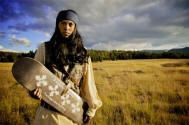 |
Image:
Dustinn Craig (White Mountain Apache/American)
born Mesa, Arizona, United States, 1975
4wheelwarpony
Photo: Courtesy of the Artist
|
Toronto — From images of Apache kids with skateboards to
traditional tribal graphics, Remix: New Modernities in a
Post-Indian World explores the challenges of being
indigenous and an artist in the 21st century.
Opening at the Art Gallery of Ontario on April 4 and continuing
through August 23, Remix features the work of 15 artists
from Canada, the United States and Mexico. This generation of
artists doesn’t feel compelled to reflect a traditional tribal
identity in their work. Instead, they are developing a
post-Indian articulation of the aboriginal identity, one that
features new ideas and challenges old perceptions.
By definition, remix means an alternative version of a song, one
that is different from the original. In the context of this
exhibition, remix represents how aboriginal artists are breaking
with the historical Indian stereotype and are redefining their
identity.
In today’s world of global influences, artists such as Kent
Monkman and Hector Ruiz use their rich Aboriginal heritage as a
foundation and are inspired by issues of culture, nationality,
ethnicity and identity, which together produce a unique creative
perspective.
"All the artists share various degrees of Native ancestry, but
they do not want this to be the only way they are defined," says
Gerald McMaster, AGO’s curator of Canadian art. "The world has
become a fusion of culture, nationality and ethnicity. These
artists use their heritage to carve a new path, creating a
distinctiveness that is different than their tribal identity of
the past."
These artists’ influences range from French theory to hip-hop
music and their work is created through a variety of media. A
large revolving sculpture of dangling animals made of bunched-up
clear plastic packing tape hangs glistening from the ceiling in
Toronto-based artist David Hannan’s work. In her Let’s Dance
video, Washington artist Anna Tsouhlarakis learns 30 different
dances – from the waltz to the twist. Presented in home-video
quality, Tsouhlarakis and a friend challenge conventional
expectations of the Aboriginal identity: instead of performing a
Native dance, she is seen performing every style of dance from
popular culture.
There are some artists in this exhibition who depict Native
subject matter more obviously than others. Taking a more
cinematic approach, a short video by Montreal-based Nadia Myre,
called Portrait in Motion, shows an aboriginal woman in a
half-birchbark and half-aluminum canoe paddling gently across a
beautiful still lake in a morning mist. This dream-like journey
becomes a metaphor for the passing of the traditional Indian
identity.
Artists in this exhibition include Dustinn Craig (White Mountain
Apache/American), Fausto Fernandez (Mexican/American), Luis
Gutierrez (Mexican/American), David Hannan (Métis), Gregory
Lomayesva (Hopi/Hispanic), Brian David Kahehtowanen Miller
(Mohawk), Franco Mondini-Ruiz (Tejano/Italian), Kent Monkman
(Cree/English/Irish), Nadia Myre (Anishinaabe), Alan Natachu
(Zuni/Laguna), Hector Ruiz (Kickapoo/Mexican/American), Anna
Tsouhlarakis (Navajo/Creek/Greek), Kade L. Twist (Cherokee),
Bernard Williams (African American/Native ancestry), and Steven
Yazzie (Navajo/Laguna Pueblo /Welsh/French/Hungarian/American).
Remix: New Modernities in a Post-Indian World is organized
by the Heard Museum in Phoenix and the Smithsonian’s National
Museum of the American Indian, and is co-curated by Gerald
McMaster and Joe Baker.
Contemporary programming is supported by the Canada Council for
the Arts.
Franco Mondini-Ruiz and Kent Monkman in Conversation
Wednesday, April 1, 7–8:30 pm
Jackman Hall
Members $15, General public $18, Students $12
Provocative Remix artists Franco Mondini-Ruiz and Kent
Monkman will discuss their work with exhibition co-curator
Gerald McMaster, AGO Curator of Canadian Art.
|
|